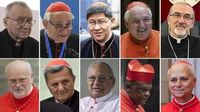As the Catholic Church mourns the loss of Pope Francis, the cardinals are now shifting their focus towards the upcoming conclave to elect his successor. This transition comes after the official mourning period, marked by significant ceremonies, including the funeral attended by over 100,000 people in St. Peter's Square.
On Saturday, April 26, 2025, a group of cardinals visited the tomb of Pope Francis at Santa Maria Maggiore, paying their respects and reflecting on the path ahead for the Church. The solemnity of the occasion was palpable as they prayed together in the chapel, a place often visited by the late pontiff before his travels. Cardinal Reinhard Marx of Munich noted, "Everything is open. The election does not depend on language, country, or culture, but on the person. It is a matter of credibility and dialogue." This sentiment underscores the complexity of the decision that lies ahead.
As the cardinals prepare to convene for the fifth general congregation on Monday, April 28, they will not only discuss the future of the Church but also address the controversial participation of Cardinal Angelo Becciu, who was convicted of embezzlement and sentenced to five years and six months in prison. Becciu's case has sparked debate among the cardinals, with some advocating for his exclusion from the conclave to maintain the integrity of the election process.
According to reports, a special commission of five cardinals, including Becciu, has been proposed to determine his eligibility. Meanwhile, the conservative faction within the Church is reportedly attempting to consolidate their influence, aiming to halt the progressive reforms initiated by Pope Francis. This faction seeks to create a narrative that portrays a widespread desire among cardinals to revert to traditional values.
During the last session on Friday, April 25, 2025, only 149 of the 252 cardinals attended, but that number is expected to rise significantly with many arriving for the funeral. It is anticipated that over 200 cardinals will participate in the upcoming meetings. The cardinals' discussions will focus on the challenges facing the Church and the profile of the new pope that is required to guide the Catholic community.
In a move that highlights the urgency of the situation, some cardinals have opted to speak earlier in the sessions to sway undecided voters. Cardinal Francis Arinze from Nigeria and Cardinal Gerhard Ludwig Müller from Germany have been particularly vocal, raising concerns among their colleagues. Their assertive approach aims to rally support for candidates who align with conservative values.
As the cardinals navigate these discussions, they are aware of the public sentiment following Pope Francis's passing. The emotional response from the faithful is a significant factor that cannot be ignored. Cardinal Marx emphasized, "We cannot ignore the feelings of the people of God during these days." This acknowledgment reflects the delicate balance the cardinals must strike between tradition and the evolving needs of the Church.
In addition, the cardinals are expected to vote on the start date of the conclave, marking a pivotal moment in the transition of leadership within the Church. The outcome of these discussions will shape the direction of the Catholic Church for years to come, as they seek a leader who can unite the diverse factions within the Church and address the pressing issues of modern society.
The recent events surrounding Pope Francis's funeral and the upcoming conclave have drawn significant attention, not only from the faithful but also from the global community. The selection of the next pope will have far-reaching implications, and the cardinals are acutely aware of the weight of their decisions.
As they gather in the coming days, the world will be watching closely, eager to see how the cardinals navigate the complexities of the conclave and what kind of leadership will emerge from this historic moment. The future of the Catholic Church hangs in the balance, and the choices made during this period will resonate for generations.
The cardinals have a monumental task ahead of them, one that requires careful deliberation and a willingness to adapt to the changing landscape of the Church. With the eyes of the world upon them, they must strive to find a leader who embodies the values of compassion, integrity, and unity that Pope Francis championed.
As the pre-conclave begins, the cardinals are poised to engage in discussions that will determine the future of the Church. Their decisions will reflect not only their individual beliefs but also the collective conscience of the Catholic community worldwide.




